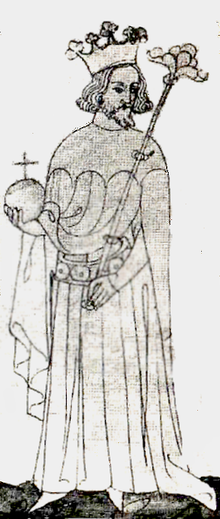John of Bohemia
| John the Blind | |
|---|---|

John I as King of Bohemia
|
|
| King of Bohemia | |
| Reign | 1310–1346 |
| Coronation | 7 February 1311, Prague |
| Predecessor | Henry |
| Successor | Emperor Charles IV |
| Count of Luxembourg, Arlon and Durbuy | |
| Reign | 1313-1346 |
| Predecessor | Henry VII |
| Successor | Emperor Charles IV |
| Born | 10 August 1296 Luxembourg |
| Died | 26 August 1346 (aged 50) near Crécy-en-Ponthieu |
| Burial | Kloster Altmünster ("Old-Minster Abbey") in Luxembourg |
| Spouse |
Elizabeth of Bohemia Beatrice of Bourbon |
| Issue |
Margaret, Duchess of Bavaria Bonne, Duchess of Normandy Charles IV, Holy Roman Emperor John Henry, Margrave of Moravia Anna, Duchess of Austria Wenceslaus I, Duke of Luxembourg |
| House | Luxembourg |
| Father | Henry VII, Holy Roman Emperor |
| Mother | Margaret of Brabant |
John the Blind (Luxembourgish: Jang de Blannen; German: Johann der Blinde von Luxemburg; Czech: Jan Lucemburský) (10 August 1296 – 26 August 1346) was the Count of Luxembourg from 1309 and King of Bohemia from 1310 and titular King of Poland. He was the eldest son of the Holy Roman Emperor Henry VII and his wife Margaret of Brabant. He is well known for having died while fighting in the Battle of Crécy at age 50, after having been blind for a decade.
Raised in Paris, John was French by education, but deeply involved in the politics of Germany. In 1310 his father arranged the marriage of the 14-year-old to Elisabeth from the Přemyslid dynasty, sister of the deceased King Wenceslaus III of Bohemia. The wedding took place in Speyer, after which the newlyweds made their way to Prague accompanied by a group led by the experienced diplomat and expert on Czech issues, Peter of Aspelt, Archbishop of Mainz. Because Henry had imperial regiments accompany and protect the couple from Nuremberg to Prague the Czech forces were able to gain control of Prague and depose the reigning King Henry of Carinthia on December 3, 1310. The Castle at Prague was uninhabitable so John made residence in one of the houses on the Old Town Square and with the help of his advisors he stabilized affairs in the Czech state. He thereby became one of the seven prince-electors of the Holy Roman Empire and – in succession of Wenceslaus III – claimant to the Polish and Hungarian throne. His attempts to follow his father as King of the Romans failed with the election of Louis IV of Wittelsbach in 1314. He later would support Louis in his rivalry with Frederick the Fair of Habsburg, culminating in the 1322 Battle of Mühldorf and in return he received the Egerland as a reward.
...
Wikipedia
